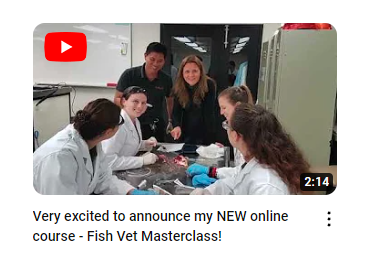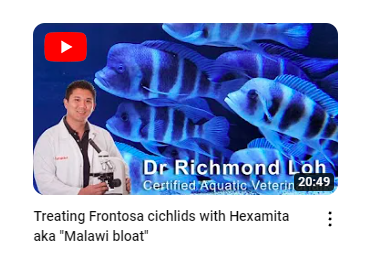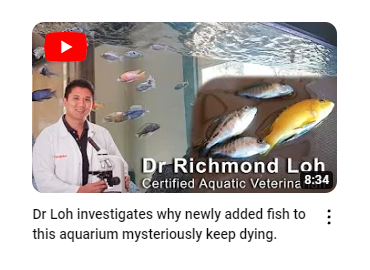Client Resources
Preparation For The Consult, Download Section, FAQs
Diagnosing fish diseases can sometimes be more involved than the more traditional veterinary consult. It is not as simple as bringing your fish to the vet. Fish consults require a special approach. To help Dr Loh provide you the best advice, please prepare beforehand, all the information TheFishVet may require.
Some useful information that you can bring along to help with the evidence gathering process
Preparation For The Consult
1. The fish in question or the worst affected fish.
*Note down any signs of disease (see the fact sheet on "How to Tell When a Fish is Sick").
2. Aquarium dimensions.
(length, width and height), planting and the number and type of fish it houses..
3. Any medications you have used, or are using;
*Please note that by treating your pet before taking it to the vet may mask the presence of certain diseases and make diagnosis more difficult.
4. Water samples:.
Tap water,
*chlorine and pH levels may be the problem.
Aquarium water without fish,
An equivalent volume of water so your fish can go home in clean water,
*also very important if we need to anaesthetise the fish.
*Fish are constantly in intimate contact with water that a great proportion of fish diseases stems from poor water quality. The water test for pH, ammonia, nitrate and nitrite is strongly recommended to provide a more complete picture of the problem.
5. Fish food (in its container).
*Certain diet types may be unsuitable or may not meet the nutritional needs of your pet fish.
6. Information about your equipment:
Your powerhead specifications (the number often denotes the volume of water it turnovers per hour);
*Lighting, Filtration type, material and size.
• If you have any problems gathering these information beforehand, Dr Loh should be able to work it out with you during the consult.
Useful YouTube Videos
Dr Loh is a Past-President and Fellow of the World Aquatic Veterinary Medical Association, and continues to help the veterinary and para-professional communities. He is also a Teaching Fellow at Murdoch University and provides advice on fish health and welfare to various universities & the RSPCA.
Fact Sheets
"Don't guess, take it to the vet."
The purpose of this page is to help with better education of fish keepers. So often when I ask people if they have ever kept fish,
the common response is,"I used to keep fish, but they died and so we gave up."
No doubt, the keen aquarists who have tried to get their friends involved in this very fulfilling hobby may have had similar responses from their friends.
So, in better education of my clients and potential fish keepers, we will reduce the number of people who could be "lost" from this popular past time.
Another point worth noting is that you may find that you get a different answer from each fish shop you ask. How do you know which one to go with when each one is adamant that they are correct? I aim to filter out "old wives' tales" from good medicine. The running theme for all the fact sheets is: "Don't guess, take it to the vet."
Visit this site regularly for more useful fact sheets to come..... (please note that these fact sheets are in pdf format)
Author: Dr Richmond Loh
Frequently Asked Questions & Answers
Here you will find a list of frequently asked questions..
Question 1. What do you do as a fish vet?
Answer
Fishes, like any other animals, can and do get sick. They may have physical ailments, become sick from a bad environment, or may succumb to infectious diseases caused by parasites and bacteria. I provide a mobile fish veterinary service and I carry a portable laboratory and pharmacy so that I can find out the causes of their illness and give them immediate appropriate treatments.
Question 2. Who do The Fish Vet service?
Answer
Our clients are diverse and range from individual pet fish owners to retailers and public aquaria, educational and research institutes, farmers and exporters, locally, interstate. Our patients range from kois and goldfish to Bettas, sharks and rays to seahorses, discus, oscars and other cichlids.
Question 3. How can you tell if a fish is sick?
Answer
Common signs of sickness in fish may include one or a combination of the following: flashing, clamped fins, dropsy (pine cone appearance), white spots, cotton wool growths, ulceration and more. These signs of disease are usually not specific to any one thing and as such, it is often difficult to make a diagnosis over the phone or just from a picture. If others say that they can do this, they are just guessing. Any treatment recommended will be by trial and error and you will lose valuable time trying to save your pet. The Fish Vet uses a combination of special tools including clinical examination, water chemistry analysis and microscopy.
Question 4. Are you a real vet?
Answer
Yes I am. I am a registered veterinarian and also have a Master's degree as well as Memberships in two subject areas – in Aquatic Animal Health (veterinary medicine of fish, crustacea and molluscs) and in Pathobiology (the study of diseases). I am a Certified Aquatic Veterinarian and a Fellow of the World Aquatic Veterinary Medical Association. My team and I are able to prescribe and supply any available medicines to treat your sick fish.
Question 5. How is Dr Loh different from other veterinarians?
Answer
Dr Loh is a registered veterinarian with over 20 years professional experience as both a fish clinician and fish pathologist, and over 35 years of fishkeeping experience with freshwater and marine aquaria, ponds and aquaponics systems. He commits to weekly Continuing Professional Development to keep abreast on the latest information. He regularly reads scientific journals (such as Diseases of Aquatic Organisms, Australian Veterinary Journal, Aquaculture Environment Interactions, Aquatic Biology, Aquatic Microbial Ecology, Aquatic Botany), obtains information from mailing lists (such as AquaVetMed, ACVSc Aquatic Animal Health Chapter, Fish Health Master Class Thailand, Australian Society for Veterinary Pathologists, ProMED-mail [a program of the International Society for Infectious Diseases]) and is active on various forums such as (WAVMA [World Aquatic Veterinary Medical Association].
Question 6. Can I organise a phone consultation?
Answer
Without seeing your fish, I can only give you very general advice. A house/site visit would offer a higher success rate in addressing your fish health issues. I am based in Perth and have representatives in Sydney, Melbourne and Canberra. Field visits outside of these places/times can be organised. If you are not located in these cities, you may wish to combine a phone consultation with email, pictures and videos. Alternatively, you can select a local veterinarian of your choice and I can take your vet through the diagnostic process and treatment options. As an aid, your vet may wish to purchase a copy of the "Australian Fish Vetting Essentials" available through my shopping cart.
Question 7. Can I bring my fish to you?
Answer
In the majority of cases, the fish's environment plays a big role in their health and well-being. In many instances, it is crucial for us to see the where and how the fish are kept and how the environment may impact on the fish health and the method for treatment. As such, we provide site visits to ensure the fish gets the appropriate treatment, without exposing you or your fish the stresses of long journeys to and from a veterinary clinic.
Question 8. Do you provide free consultation?
Answer
We received a lot of private messages from people with questions about their sick fish.
I'm happy to answer questions and prefer to do so in public forum so that everyone can benefit
from the information discussed and shared. So if you have a question about your fish feel free to create a post
(with good quality photos or videos which are very helpful) in our VISITOR post section on our
Facebook Page.
Note, I can offer general advice only on a non-urgent basis,
and if you have an urgent matter and/or require a diagnosis you should contact your local fish veterinarian for an immediate consultation.
Question 9. What are your fees?
Answer
Veterinary fees are commensurate with the level of difficulty and the time it takes to provide the service. Depending on the type of service required, I have hourly rates, daily rates or I can work on a monthly retainer basis. Medications, ancillary testing or procedures and disbursements are in addition to the timed fees.
Question 10. What is your background?
Answer
I was born in Malaysia and migrated to Perth, Australia to complete my schooling and tertiary education. I landed my first job as a Fish Pathologist in Tasmania, servicing the large aquaculture farms, working with salmon, trout, abalone and oysters. Clinically, I began working out of Launceston Veterinary Clinic with ornamental fish in 2002 helping people with fish ailments. Now I am based in Perth and operate a mobile fish veterinary practice, with associates in Sydney, Melbourne and Canberra.




